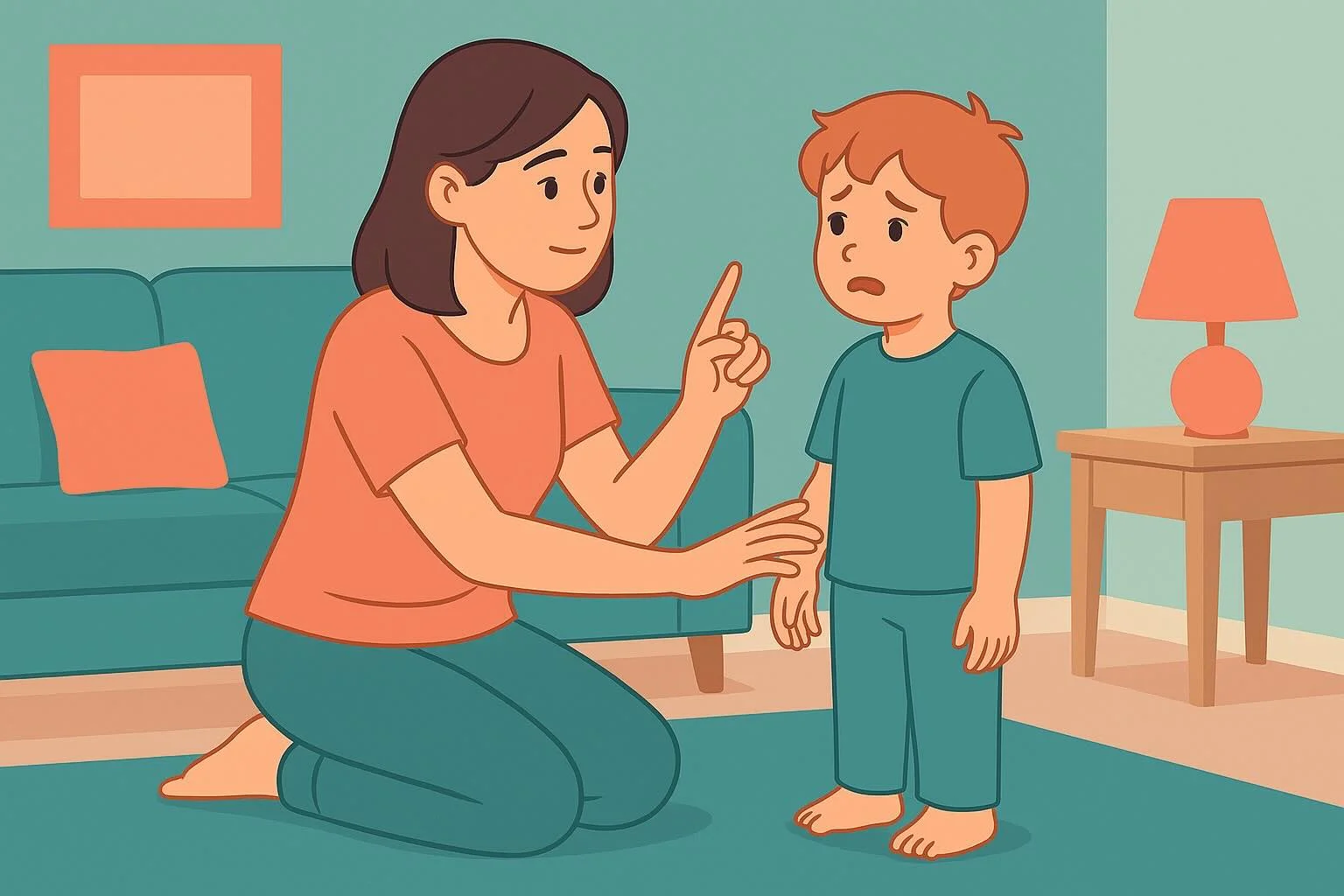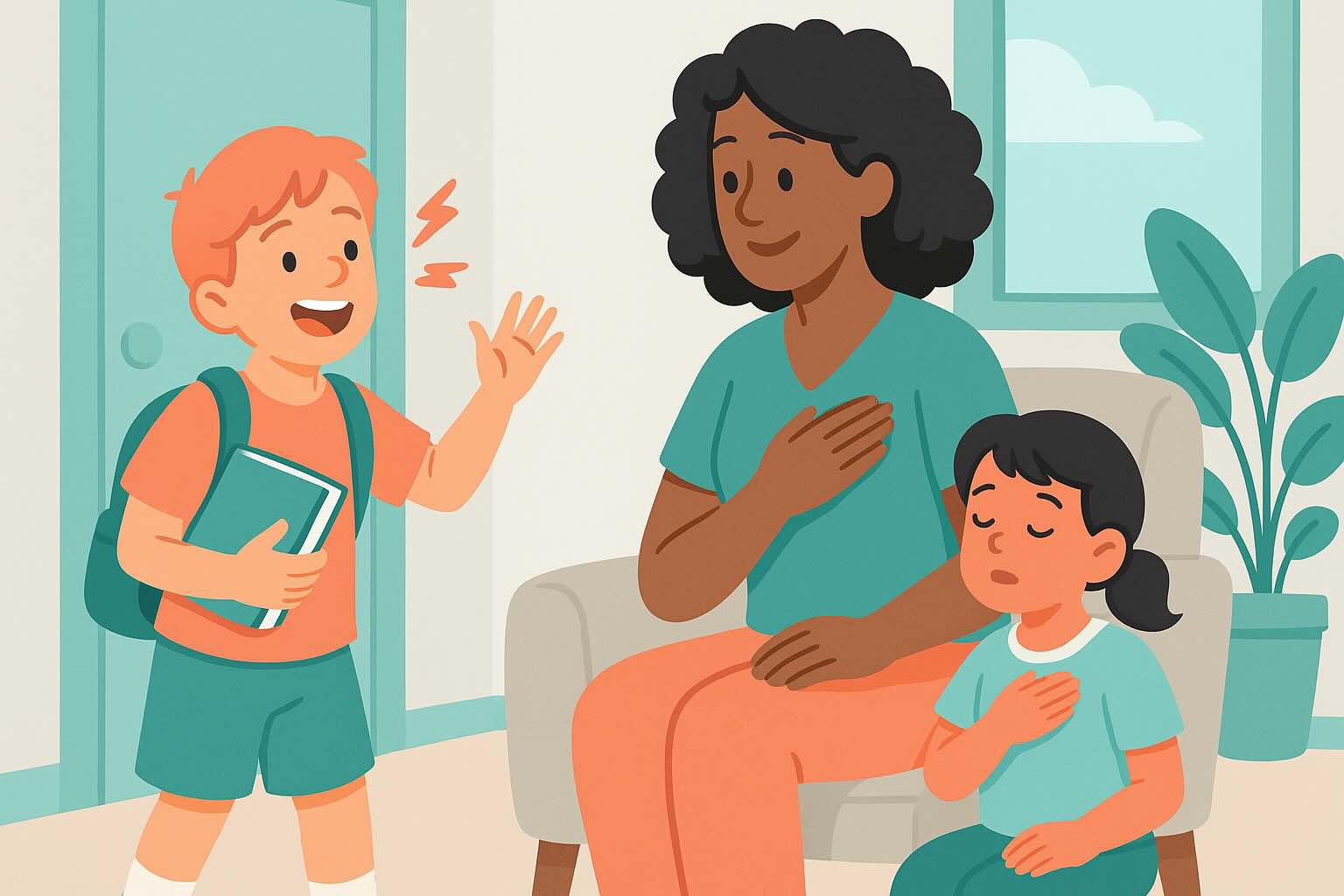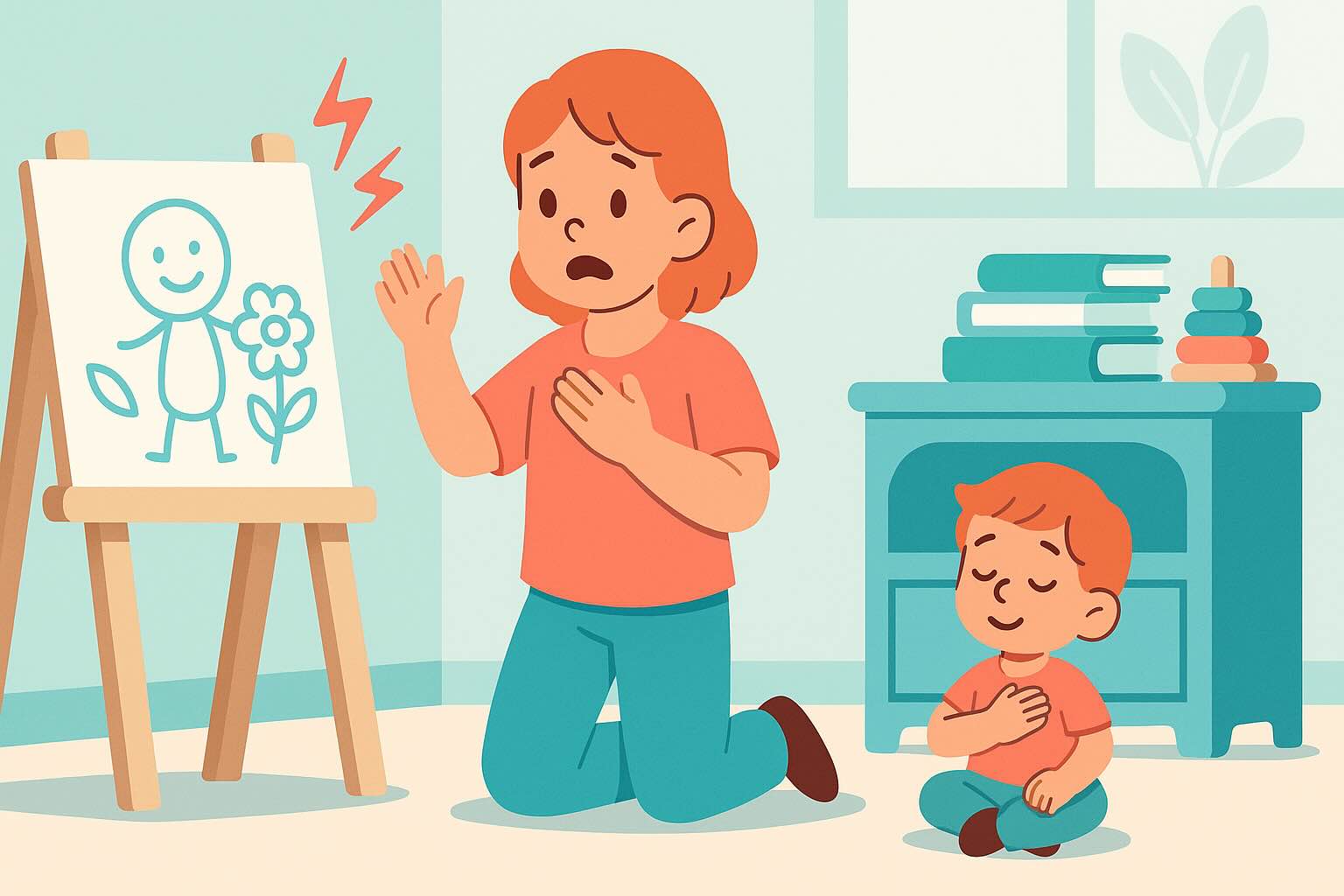Natural Consequences: 8 Ways to Let Life Teach Better Than Punishments

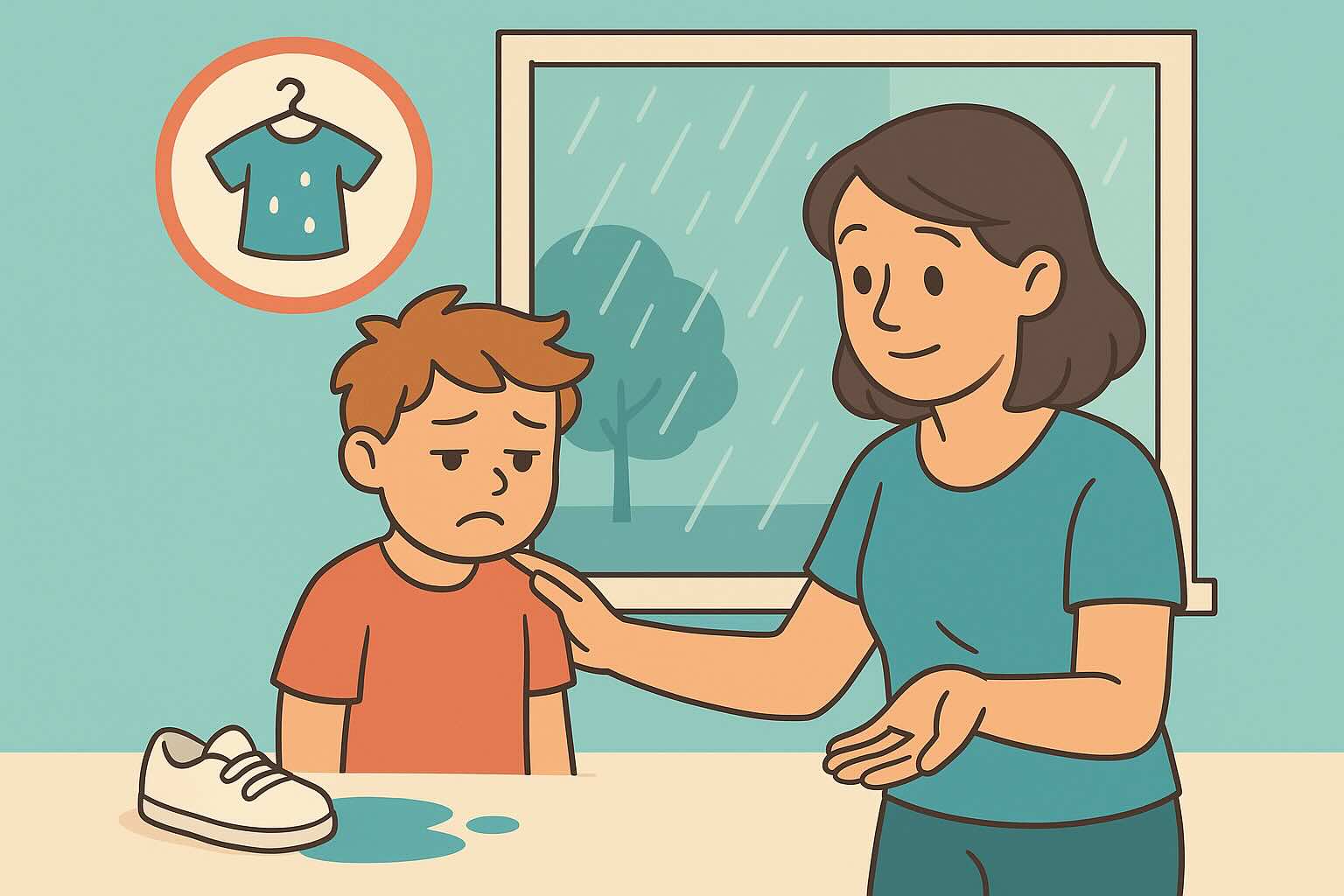
Your 4-year-old insists on going outside without a coat on a chilly morning. Your instinct might be to force the coat on them, negotiate, or use threats. But what if there's a more effective approach that actually teaches them to make better decisions independently?
Natural consequences parenting lets life be the teacher instead of you. Rather than imposing arbitrary punishments or bribes, this approach allows children to experience the real-world results of their choices in safe, age-appropriate ways. When children feel cold because they didn't wear a coat, they learn more about weather and clothing than any lecture could teach.
This comprehensive guide will show you how to step back and let reality do the teaching, building your child's problem-solving skills, responsibility, and real-world competence. For complementary approaches, see our guides on emotional safety first and curious not furious parenting.
What You'll Learn in This Guide
- Natural vs. Logical vs. Punitive Consequences - Understanding the different types and when to use each
- The Learning Power of Reality - Why experience teaches better than words
- Age-Appropriate Natural Consequences - What works safely for 3-7 year olds
- When to Step Back vs. When to Intervene - Safety guidelines and judgment calls
- Building Problem-Solving Skills - How consequences develop thinking abilities
- Resisting the Rescue Urge - Supporting without saving your child from learning
- Creating Logical Consequences - When natural ones aren't enough
- Real-Life Applications - Practical examples for daily situations
Estimated reading time: 14 minutes
Understanding Different Types of Consequences
Natural Consequences: Reality's Lessons
Natural consequences occur automatically as a result of behavior:
- Touch something hot → feel pain
- Don't eat lunch → feel hungry
- Leave bike in the rain → bike gets rusty
- Don't wear gloves → hands get cold
- Throw a toy roughly → toy breaks
Key characteristics:
- Happen without parent intervention
- Directly related to the child's choice
- Provide immediate or timely feedback
- Teach real-world cause and effect
- Build natural learning connections
Logical Consequences: Parent-Created Reality
Logical consequences are imposed by parents but mirror natural outcomes:
- Make a mess → clean it up
- Break something → replace it or go without
- Misuse a privilege → lose access to it temporarily
- Hurt someone → make amends
- Don't do chores → lose related privileges
Key characteristics:
- Created by parents but reasonable and related
- Connected directly to the behavior
- Focus on problem-solving rather than punishment
- Teach responsibility and repair
- Mirror what would happen in adult life
Punitive Consequences: Arbitrary Punishments
Punitive consequences are unrelated to the behavior:
- Don't clean room → lose screen time
- Talk back → go to time-out
- Forget homework → can't play with friends
- Sibling conflict → early bedtime
Why punitive consequences are less effective:
- No logical connection between behavior and consequence
- Focus on making children suffer rather than learn
- Don't teach problem-solving or responsibility
- Often increase resistance and resentment
- Miss opportunities for real learning
The Science Behind Learning from Experience
How Children's Brains Process Consequences
Neurological development:
- Young children learn best through concrete, immediate experiences
- Abstract reasoning develops slowly over childhood
- Cause-and-effect understanding strengthens with repeated experiences
- Emotional memory often stronger than cognitive memory
- Real experiences create lasting neural pathways
Why natural consequences work:
- They're immediate and concrete
- They engage multiple senses and emotions
- They don't trigger defensiveness like punishments do
- They build intrinsic motivation rather than compliance
- They teach skills transferable to other situations
The Problem-Solving Brain
When children experience natural consequences:
- They must think through what happened
- They consider what they could do differently
- They develop internal motivation to change behavior
- They build confidence in their ability to solve problems
- They learn to trust their own judgment
When we rescue them from consequences:
- They don't develop problem-solving muscles
- They become dependent on adults to fix things
- They don't learn to anticipate outcomes
- They miss opportunities to build resilience
- They may become entitled or irresponsible
Age-Appropriate Natural Consequences
Ages 3-4: Simple, Immediate Consequences
At this age, consequences need to be immediate and directly observable for children to make connections.
Effective natural consequences:
- Spill drink → help clean up the mess
- Throw food → meal ends, feel hungry later
- Don't put on shoes → feet get cold/dirty outside
- Break toy by mishandling → toy no longer works
- Don't brush teeth → teeth feel yucky
What to avoid:
- Consequences that are too delayed
- Situations where safety is genuinely at risk
- Consequences that are too harsh for the developmental stage
- Abstract connections they can't yet understand
Example scenario: Refusing to wear coat
- Natural consequence: Child feels cold outside
- Parent response: "You're feeling cold. That's what happens when we don't wear coats in cold weather."
- Avoid: "I told you so!" or immediately providing a solution
Ages 5-7: More Complex Cause and Effect
Older children can handle more complex consequences and understand longer-term effects.
Effective natural consequences:
- Forget homework → face teacher's response
- Don't pack lunch → be hungry at school
- Rough play with friends → friends don't want to play
- Procrastinate on projects → rush and stress at deadline
- Lose/break belongings → go without or work to replace
Increased complexity they can handle:
- Consequences that happen hours later
- Social consequences from peer relationships
- Academic consequences from school choices
- Financial consequences (with age-appropriate amounts)
- Reputation consequences from their behavior
Example scenario: Forgetting library book
- Natural consequence: Can't check out new books until it's returned
- Parent response: "That's disappointing. What do you think you could do to remember next time?"
- Avoid: Rushing to find the book for them or blaming the library
When to Step Back vs. When to Intervene
Safety First: Always Intervene
Immediate intervention required:
- Physical safety risks (traffic, heights, sharp objects)
- Situations that could cause serious harm to others
- Behaviors that could damage important property
- Situations involving strangers or inappropriate adults
- Medical or health-related consequences
How to intervene safely while still teaching:
- "I can't let you run in the street because cars could hurt you"
- "I need to stop you from hitting because we keep everyone safe"
- "This situation isn't safe for learning right now"
When Natural Consequences Are Too Harsh
Modify or supplement when:
- Consequences would be traumatic or overwhelming
- Child lacks developmental capacity to understand
- Consequences affect others significantly
- Timing makes learning impossible
- Natural consequences might cause shame rather than learning
Examples of modification:
- Too harsh: Child forgets lunch, goes hungry all day
- Modified: Pack emergency snack but let them experience initial hunger
- Too harsh: Child breaks expensive item, family finances affected
- Modified: Child contributes to replacement within their capacity
Supporting Without Rescuing
Helpful support responses:
- "That must be frustrating. What do you think you could try?"
- "I see you're dealing with the results of that choice"
- "How are you planning to handle this situation?"
- "What could you do differently next time?"
Rescuing responses to avoid:
- "Don't worry, I'll fix it for you"
- "This isn't that big a deal"
- "Let me take care of this right away"
- "You don't have to worry about consequences"
Building Problem-Solving Skills Through Consequences
The Learning Process
Stage 1: Experience the consequence
- Child faces natural result of their choice
- May express frustration, disappointment, or regret
- Parent offers empathy without fixing
Stage 2: Process what happened
- Child begins to understand cause and effect
- Parent asks curious questions about the experience
- Focus on understanding rather than lecturing
Stage 3: Generate solutions
- Child thinks about what they could do differently
- Parent guides with questions rather than answers
- Multiple options explored together
Stage 4: Apply learning
- Child tries new approach in similar situation
- Parent acknowledges effort and problem-solving
- Learning reinforced through successful experience
Questioning Techniques That Build Thinking
Instead of telling, ask:
- "What do you think happened?"
- "How do you feel about how that turned out?"
- "What would you like to happen differently next time?"
- "What are some things you could try?"
- "How do you think that might work?"
Follow-up questions that deepen learning:
- "What was the hardest part about that?"
- "What surprised you about what happened?"
- "How did you figure out what to do?"
- "What would you tell another kid in this situation?"
Creating Logical Consequences When Natural Ones Aren't Enough
When to Create Logical Consequences
Natural consequences may be insufficient when:
- They're too delayed to be effective
- They don't exist for the specific behavior
- They're too mild to motivate change
- They affect others more than the child
- The child seems unable to make the connection
Designing Effective Logical Consequences
Characteristics of good logical consequences:
- Related: Directly connected to the behavior
- Respectful: Not designed to humiliate or shame
- Reasonable: Appropriate for the child's age and the situation
- Revealed: Child understands the connection in advance when possible
Examples of well-designed logical consequences:
Messy behavior:
- Logical consequence: Clean up the mess
- Connection: Those who make messes are responsible for cleaning them
Misusing privileges:
- Logical consequence: Temporary loss of privilege
- Connection: Privileges require responsible behavior
Not following through on commitments:
- Logical consequence: Others can't count on your promises
- Connection: Reliability affects trust and opportunities
Poor Logical Consequences to Avoid
Unrelated consequences:
- Don't clean room → lose screen time (no connection)
- Argue with siblings → no dessert (unrelated)
- Forget homework → early bedtime (not connected)
Overly harsh consequences:
- Small mistake → major privilege loss
- Age-inappropriate expectations → adult-level consequences
- Single incident → permanent loss of privilege
Real-Life Natural and Logical Consequence Applications
Morning Routine Challenges
Dawdling and lateness:
- Natural consequence: Miss preferred activities due to time constraints
- Parent response: "We don't have time for the playground when we leave late. That's disappointing."
- Logical consequence: Earlier bedtime to ensure enough sleep for morning energy
Forgetting items:
- Natural consequence: Face inconvenience of not having needed items
- Parent response: "It's hard to be cold without your jacket. What could help you remember tomorrow?"
- Avoid: Bringing forgotten items to school
Meal Time Issues
Refusing to eat:
- Natural consequence: Feel hungry until next meal/snack
- Parent response: "Your tummy is telling you it needs food. Dinner will be ready at 6."
- Logical consequence: Kitchen closes after meal time
Playing with food:
- Natural consequence: Less food available to satisfy hunger
- Logical consequence: Meal ends when food becomes toys
- Parent response: "Food is for eating. When it becomes a toy, meal time is over."
Toy and Belonging Care
Rough handling of toys:
- Natural consequence: Toys break and stop working
- Parent response: "Your truck broke when you threw it. That's sad."
- Logical consequence: Broken toys aren't replaced immediately
Not putting toys away:
- Natural consequence: Can't find toys when wanted
- Logical consequence: Toys left out become unavailable for the day
- Parent response: "Toys that aren't put away aren't available for playing."
Social Situations
Rough play with friends:
- Natural consequence: Friends don't want to play or leave
- Parent response: "Sarah left because rough play doesn't feel fun to her."
- Logical consequence: Playdate ends when playing becomes hurtful
Interrupting conversations:
- Natural consequence: Important information gets missed
- Logical consequence: Wait longer to have your needs met
- Parent response: "When you interrupt, I can't hear what you need."
Supporting Your Child Through Consequences
Empathy Without Rescue
Helpful empathetic responses:
- "That's really disappointing"
- "I can see you're frustrated about this"
- "It's hard when things don't work out the way we want"
- "That must feel frustrating"
Avoid:
- "I told you this would happen"
- "Maybe next time you'll listen"
- "This is your own fault"
- "You should have known better"
Teaching Moments After Consequences
Wait for the right timing:
- Don't lecture during emotional moments
- Wait until child is calm and receptive
- Choose times when you're both relaxed
- Let the experience settle before processing
Ask rather than tell:
- "What did you notice about what happened?"
- "How do you think you could handle this differently?"
- "What would you want to happen next time?"
- "What did you learn from this experience?"
Your 4-Week Natural Consequences Implementation Plan
Week 1: Observation and Planning
- Identify current punishment patterns that could become natural consequences
- Notice opportunities for safe, age-appropriate natural consequences
- Practice stepping back when your child faces minor difficulties
- Begin using empathy without rescue language
Week 2: Simple Natural Consequences
- Allow safe, immediate natural consequences to occur
- Practice supportive responses without fixing
- Work on resisting the urge to rescue
- Start asking curious questions about experiences
Week 3: Logical Consequences
- Design logical consequences for behaviors that need them
- Focus on related, respectful, reasonable consequences
- Practice explaining connections between choices and outcomes
- Work on consistency across different situations
Week 4: Integration and Problem-Solving
- Combine natural and logical consequences as appropriate
- Focus on building problem-solving through questioning
- Help your child make connections between choices and outcomes
- Evaluate what's working and adjust your approach
Signs Natural Consequences Are Working
Immediate Signs (1-2 weeks)
- Your child begins thinking before acting in familiar situations
- They show less resistance to your guidance
- You feel less like the "bad guy" enforcing arbitrary rules
- Your child starts problem-solving small issues independently
Medium-term Signs (3-4 weeks)
- Your child anticipates consequences before making choices
- They take more responsibility for their mistakes
- They show increased resilience when things don't go their way
- Problem-solving skills improve across different situations
Long-term Signs (2-3 months)
- Your child develops internal motivation for good choices
- They show increased empathy and consideration for others
- They bounce back from setbacks more quickly
- They demonstrate real-world competence and responsibility
Key Takeaways: Your Natural Consequences Guide
- ✅ Let reality be the teacher - natural consequences are more effective than imposed punishments
- ✅ Safety always comes first - intervene when real harm could occur
- ✅ Support without rescuing - offer empathy while letting learning happen
- ✅ Make logical consequences related - connect consequences directly to the behavior
- ✅ Ask questions instead of lecturing - build thinking skills through curious questioning
- ✅ Age-appropriate expectations - match consequences to developmental capacity
- ✅ Resist the rescue urge - discomfort often leads to the best learning
- ✅ Focus on problem-solving - help children think through solutions
- ✅ Be patient with the process - learning from experience takes time
- ✅ Empathy without fixing - validate feelings while maintaining consequences
Remember: Your goal isn't to make your child suffer - it's to help them develop the problem-solving skills, responsibility, and real-world competence they'll need throughout their life. When you let safe, natural consequences do the teaching, you're preparing your child to navigate the world independently and confidently. Trust the process, support them through the learning, and watch their competence grow.
This article is based on natural learning theory, child development research, and practical parenting psychology. Every child's response to consequences is different, and implementing this approach takes patience and practice. Focus on building problem-solving skills rather than perfect compliance as you develop these parenting tools.
24/7 AI Parenting Assistant
Get instant, personalized advice with expert-curated parenting knowledge. Chat with your AI coach anytime, anywhere.
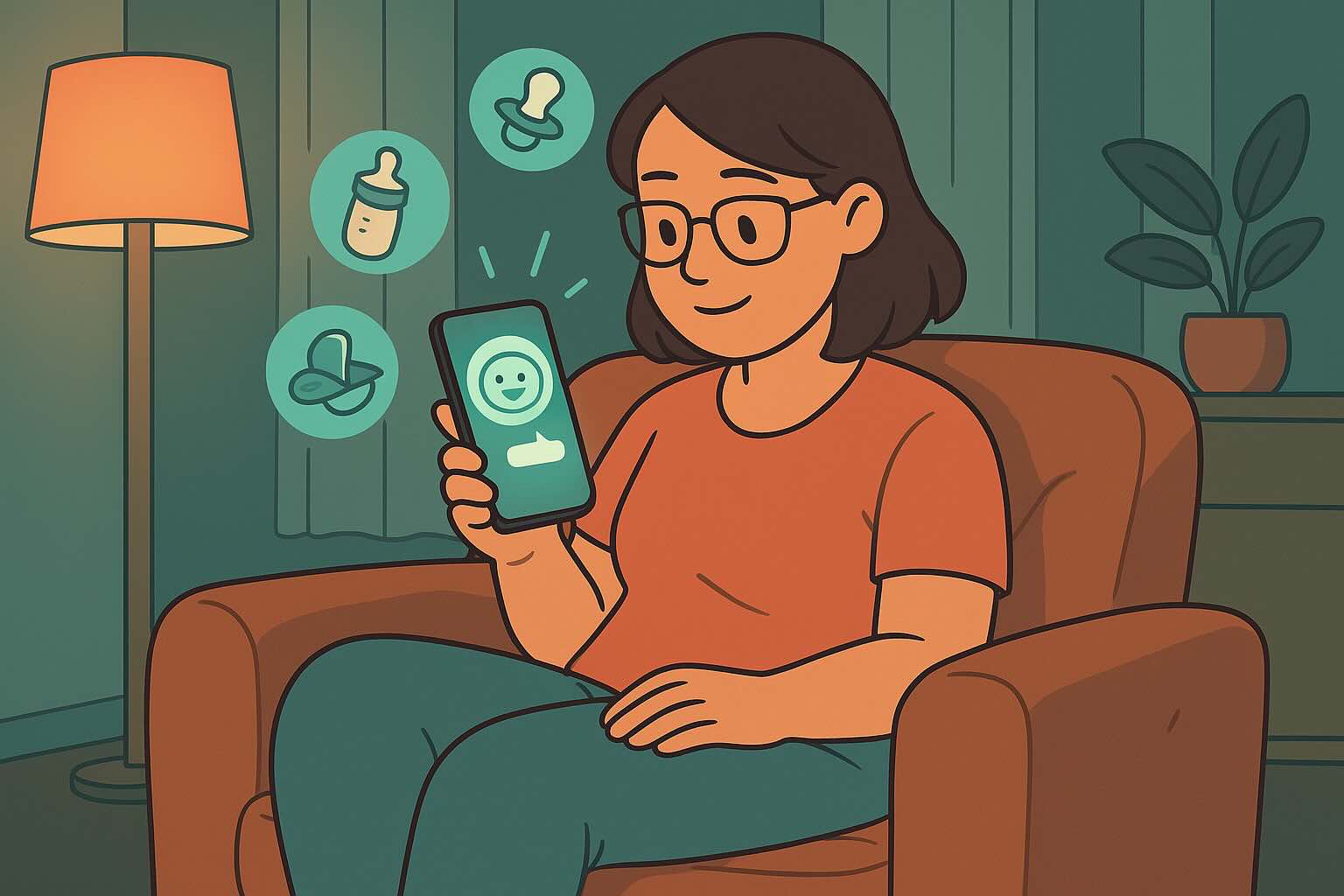
Boundary Setting Scripts
Set firm, loving boundaries without punishment using evidence-based scripts and strategies that build cooperation and respect.
Frequently Asked Questions
Need personalized support?
RootWise's AI coach can provide tailored strategies for your specific situation, available 24/7 when you need it most.
Learn More About AI Coaching →